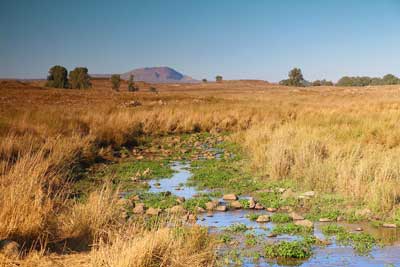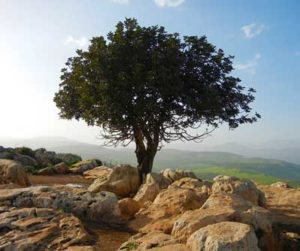 This article is a part of the Biblical Hope series. To start this study from the beginning, click here: Biblical Hope.
This article is a part of the Biblical Hope series. To start this study from the beginning, click here: Biblical Hope.
What does the story of the Jew and the formation of Israel have to do with being a disciple of hope?
The answers is found in Romans 8:20-25:
For the creation was subjected to futility, not willingly, but because of him who subjected it, in hope that the creation itself will be set free from its bondage to corruption and obtain the freedom of the glory of the children of God. For we know that the whole creation has been groaning together in the pains of childbirth until now. And not only the creation, but we ourselves, who have the firstfruits of the Spirit, groan inwardly as we wait eagerly for adoption as sons, the redemption of our bodies. For in this hope we were saved. Now hope that is seen is not hope. For who hopes for what he sees? But if we hope for what we do not see, we await for it with patience.
The only explanation of why hope is even a part of the human story is because of the episode in the Garden and the promise given at that time.
The answer to the age-old question of “why do good people suffer? is because they are created beings, which means they are subject to a timeless, universal dilemma that can only be explained by the Scriptures.
As created beings, we enter into a universal free-fall of a life of consequence. It is not random. It is a combination of personal decisions, decisions of those in authority or partnership with us, and ultimately, national decisions that have generational impact.
However, if we ignore the history that only the Bible offers, we lose the option for deliverance.
There is an enemy, a snake in the garden, who is effective in steering us to willfully make wrong choices, which will cause personal pain that will affect others.
We have been taught to beware of the religious spirit or familiar spirit which counseled Adam to sew fig leaves over their nakedness and shame. It is the same spirit, alive today, that ignores the snake in the garden. Instead, it tells us to put a fence around its neat rows with a sign posted “no snakes allowed” and goes on planting flowers as if all is well.
But all is not well. There are wrong choices, unwelcome consequences that bring regret and there is an enemy at our heel.
God, however, has not left us to ourselves.
God’s solution is the insert of HOPE to the human dilemma.
He reveals the power of hope through people faced with its need and who exercise it. These people will ultimately become a nation which face those same personal needs at the national level.
That is why we study this as disciples. It is the method God gives us.
Now Sarai, Abram’s wife, had borne him no children. She had a female Egyptian servant whose name was Hagar. And Sarai said to Abram, “Behold now, the Lord has prevented me from bearing children. Go in to my servant; it may be that I shall obtain children by her.” And Abram listened to the voice of Sarai. (Genesis 16:1-2 ESV)
Abram listened to the voice of Sarai, instead of taking his counsel from God. This is reminiscent of the Garden.
Principle 22: It is very easy to be swayed by an emotional need in decision making. Seeking “first” the Kingdom of God is a discipline not easily learned.
Consequences are available to tutor us:
- Abram went to Egypt without counsel, he came back with Hagar
- Contempt is conceived, enmity will its fruit (Genesis 16:4)
Abram will have to wait another 14 years before his son of promise is born. (Genesis 17:1)
Faithful to His promise:
- His seed is to be blessed and multiplied
- He will also be trouble
Principle 23: Being blessed does not assure being a blessing. The true seed of Abraham will be a blessing. (Genesis 12:3)
Free will is still a determining factor.
Re-affirming the Covenant (Genesis 17:7-8)
- The land is for descendants
- Distinguishing the seed promise
- Ishmael will have a great descendancy
- Isaac will be the covenant descendant and inherit the associated blessings, which will be transfer to his children (zerah) – Genesis 17:19
Across the planet, God only made one real estate deal, the land of Israel. The rest was on the open market.
Why will this plan become the most contested piece of real estate in history?
It is the location from which all the prophetic promises revolve.
Without Israel, the promises of God are baseless. That is exactly what the serpent has devised as his central theme, to make God’s word appear baseless, untrustworthy, and foolish.
In effect, the serpent wins out.
The first born of promise
The Lord makes a personal visitation to Abraham and Sarah to confirm the covenant. In the last episode, Abraham laughed. Now, we find Sarah doing the same (Genesis 18:12), though she denies it. No wonder the son of promise is called Isaac. “Laughter” in the midst of the unlikely and the uncertain. Laughter in the turmoil of unbelief.
Isaac is a fitting name for the first born of promise. His name means laughter. His life of promise and the descendants to follow are not functioning amidst an atmosphere that is humorous. Their story is immersed in a world of suffering into which they will become the objects of much scorn and rejection.
Laughter is their gift. It is characteristic of the “blessing” that they are called to be to the nations. It is crazy to think that the people group which has suffered for the longest period of human history has also produced an inordinate proportion of comedians to date.
Principle 24: Because we have hope, it is okay to laugh!
For I have chosen him, that he may command his children and his household after him to keep the way of the Lord by doing righteousness and justice, so that the Lord may bring to Abraham what he has promised him.” (Genesis 18:19 ESV)
Righteousness is a crucial identification of the seed of promise; he practices righteousness and justice. Abraham gets his cue from the Judge of the whole earth, whom he is about to challenge in an unfolding decision.
“Shall not the Judge of all the earth do what is right?”
Question: What is the sin of Sodom?
Behold, this was the guilt of your sister Sodom: she and her daughters had pride, excess of food, and prosperous ease, but did not aid the poor and needy. They were haughty and did an abomination before me. So I removed them, when I saw it. (Ezekiel 16:49-50)
Our Citizenship in Regard to Suffering
What if we, as Believers, see ourselves as the Bible describes us? How much more effective could we be?
We are told that as Believers, we are so different that we actually receive a heart and mind transplant upon conversion.
Consider this possible analogy:
I grow up on this planet and become fully familiar with its culture, language and rhythm. Then, I am transported to another planet, a heavenly one. I am given a mind to think marvelous thoughts and abilities I never conceived before. My heart beats with gratitude and compassion. My new rhythm is in full sway with my feelings of belonging. I eagerly join in to sing a new song of praise in gratitude to my King, and I am a patriotic and loyal patron of His Kingdom. Then, I am sent back to the planet from which I came.
I have immediate recall. I can understand and speak the language and am fully familiar with the culture. I am drawn to old practices and tempted by once familiar habits. However, a voice within alerts me to the distinction between my two worlds.
This is a place of suffering.
Because I am here, I understand why. Is suffering something I must avoid at all costs, or do I enter into it as a surgeon enters the operating room? My other choices are to make an attempt to minimize it through cosmetic living and means of distraction, or focus on my own pain and ignore others. I recognize that this human heart cannot bear the pain of others. Either I run from it or try and make it disappear.
Temptations to dismiss the pain are all around me. It seems that the entire culture is geared on covering pain and suffering. Medications, vacations, makeup, new things to buy.
And yet, another thought rises to the top. I am not here to just make it through the suffering. I am here to make a difference. This is a land of suffering, and it is under the sway (rhythm) of an evil dictator. My mission is not to survive, but to penetrate and rescue. I have returned here with power and purpose.
I now have dual citizenship. My home is in Heaven where sorrow and sighing have fled away. For now, I am here and I am desperately needed.
The citizens of this planet need to know that this is a temporary habitation. An evil dictator governs it. He governs by deception. His ambition is to steal them away from the love of their Maker. He lures with every available means to love themselves, things, seek acceptance and recognition. He does everything in his power to see suffering as an indicator of something so much deeper, and like piped in music in an elevator or dentist office, he lulls entire populations into the sleep of deception.
I must alert them to the way of escape. That is the reason I am here. That is why I am equipped.
He has delivered us from the domain of darkness and transferred us to the kingdom of his beloved Son (Colossians 1:13)
Share in suffering as a good soldier of Christ Jesus. (2 Timothy 2:3)
The context of this is taken from the preceding verse, the model of discipleship.
You then, my child, be strengthened by the grace that is in Christ Jesus, and what you have heard from me in the presence of many witnesses entrust to faithful men who will be able to teach others also. (2 Timothy 2:1-2)
For you always have the poor with you, but you will not always have me. (Matthew 26:11)
When Abraham was first introduced to the One true God, he was given a promise which contained three significant terms:
- He would be blessed to be a blessing
- He would have offspring
- He would have land
There were no conditions included. The blessing gave him a meaningful life. The offspring gave him a secure future in old age. The land gave him a place of belonging and means of income.
All three terms contributed to a hope-filled life. All three added to the responsibility to live as a man of Promise.
Principle 25: We need to include these elements within the context of evangelism.
Abraham would need it. The land in which God called him to sojourn was culturally depraved and filled with danger.
And Abimelech said to Abraham, “What did you see, that you did this thing?” Abraham said, “I did it because I thought, ‘There is no fear of God at all in this place, (Genesis 20:10-11)
Principle 26: When we sense the fear of God is missing in a place we have ventured, it may be better to leave than to conjure up a reason to stay!
Abraham did what seemed right and Ishmael was born. Lot did the same and Moab and Ammon were born. Both would become historic enemies until the end of days. (Psalms 83)
Next article: The Birth of Laughter, the Promised Seed
© Do not copy or distribute without permission from the author. Please contact us for more information.


